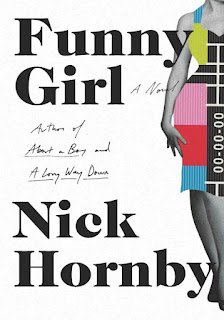All of the books I've read of his were set in the modern world - Juliet, Naked most recently, for all that I was a decade late getting to it.
But he's dropped into the past at least once: Funny Girl, his 2014 novel, is set mostly in the mid-60s. It's a quirky book in the Hornby oeuvre, and I don't think entirely successful.
Funny Girl is the story of Barbara Parker from Blackpool, who wants to be on TV, to be funny in public - she basically wants to be Lucille Ball, or to be herself as a British version of Lucy. But it's also the story of Barbara (and Jim), the sitcom she gets hired for, and helps to mold, soon after she reaches London.
And that's the problem: Funny Girl is a breezy, fairly short novel that covers four to five years in depth and then jumps to the then-current day, fifty years later, while trying to be about two interlinked but distinct things, which each could have used a lot more depth than Hornby is willing to give them.
It could have been more focused on Barbara, who becomes Sophie Straw for TV-credits purpose and then finds herself playing a career-defining role using her semi-abandoned real name. There's a lot of potential drama or insight there; Hornby states it and never does anything with it. We also don't see much of Barbara/Sophie's life during the '60s - what else she did, who she saw, what it was like to be young in a place where things were changing quickly. We know she does one movie after the first series of her show, but don't get any other details of her career until the coda, fifty years later - are we to assume she spent the hiatuses between the other series doing nothing? In London? In her early twenties? In the mid-1960s?
That's another theme of the book, another piece not given enough space and life to blossom. It comes up repeatedly, but mostly in passing: are these mostly hard-working people staying in touch with "the young audience"? What is happening in Britain in these years? (I don't think the term "Swinging London" is ever used, but that's the background.)
The show Barbara (and Jim) runs for four series, which seem to be roughly yearly starting in 1964. But the main bulk of the book absolutely does not seem to cover four or five years - not enough is happening, not enough is changing. It feels like all of the characters are utterly static while they're off the page, that only the moments Hornby depicts here are "real" and transformative, and there just aren't enough moments here, over several years and at least half-a-dozen major characters, for that to work.
Taking a term from something entirely different, I'd call Funny Girl an example of scope creep. It could have been a strong novel about Barbara, focused tightly on her as she went to London, launched a career, and worked through that show. Or it could have started with her but told the story of the first series of Barbara (and Jim), looping around to give the points of view of all of the major characters. As it is, it tries to do both of those things, and more, and then wrap it all up in a bow fifty years later for an entirely different purpose, and none of that has enough space to work.
Hornby is always readable; this book went by very quickly. (Too quickly, as I've been saying.) It is a pleasure to read, and its people feel real in their moments on the page. All its flaws are larger and structural; all of its problems are baked in deeply. So it goes.

No comments:
Post a Comment